
Let's talk American Staffordshire Terriers
The American Staffordshire Terrier likes having something to do. Often. When it comes to sniffing things out, they are a perceptive breed, able to quickly read people and situations. The American Staffordshire Terrier may look like a bruiser but underneath all that muscle is an adorable canine who is highly affectionate towards humans. When it comes to training your American Staffordshire Terrier, the earlier the better. A firm approach is required but the reward is a devoted and obedient companion—for life.Official name: American Staffordshire Terrier
Other names: AmStaff, American Staff
Origins: United States

| Drooling tendencies |
|
Warm weather? | |
| Shedding level |  |
Suited to apartment living? | 
|
| Energy level (high, low, medium) *: | Medium | Family pet? * |
 |
| Compatibility with other pets |  |
Can stay alone?* |  |
* We advise against leaving pets alone for long stretches. Companionship can prevent emotional distress and destructive behaviour. Speak to your veterinarian for recommendations.
Every pet is different, even within a breed; this snapshot of this breed’s specifics should be taken as an indication.
For a happy, healthy and well-behaved pet, we recommend educating and socialising your pet as well as covering their basic welfare, social and behavioural needs.
Pets should never be left unsupervised with a child.
All domestic pets are sociable and prefer company. However, they can be taught to cope with solitude from an early age. Seek the advice of your veterinarian or trainer to help you do this.
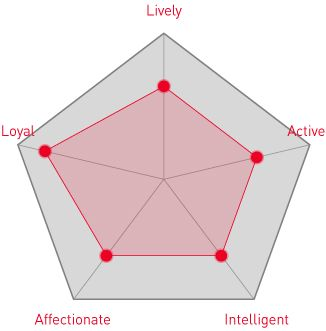

| Baby age: | Birth to 2 months |
| Puppy age: | 2 to 12 months |
| Adult age: | 1 - 7 years |
| Mature age: | 7 - 10 years |
| Senior age: | 10 years upwards |
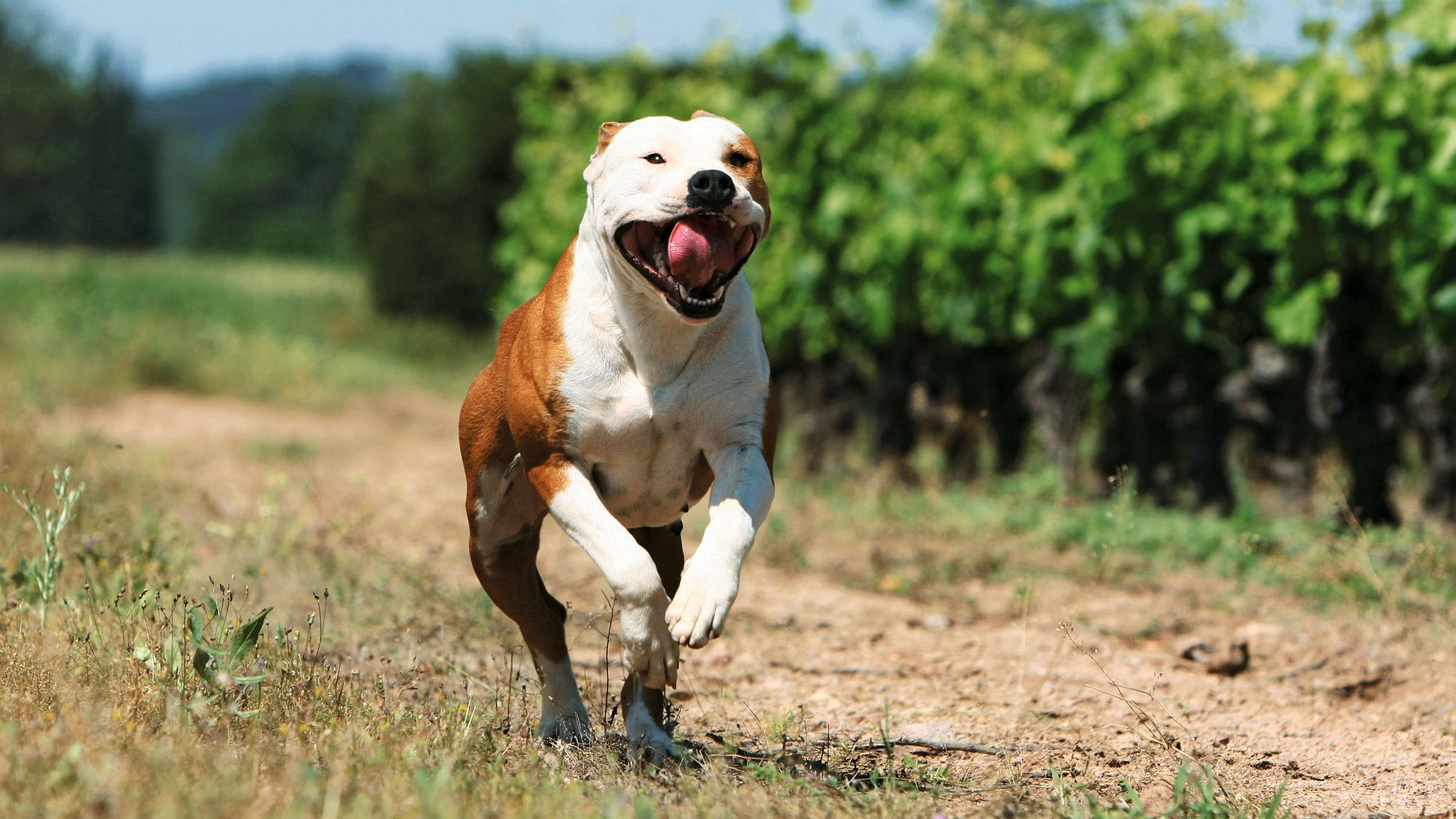
1/7
Get to know the American Staffordshire Terrier
All you need to know about the breed
It’s family first for the American Staffordshire Terrier, make no bones about it. Due to their muscular build and brawler roots, the breed is often assumed to be a fighter and not a lover. It is in fact the opposite. The American Staffordshire Terrier is highly affectionate and capable of forming a strong bond with their owners, including children—once they’ve had some training.
While they are happy to curl up with you on the sofa, make sure you’ve both had a workout first. Leaving them to run around the garden won’t cut it. The American Staffordshire Terrier requires plenty of interactive stimulation for a healthy physical and psychological growth. They flourish with a self-assured owner who loves the great outdoors and takes a consistent approach to training. When starting out, carry a treat in your pocket to provide motivation—this should count as part of their daily calorie allowance. On the lazy side? Possibly not the breed for you. When outside, be sure to pop some doggy sunscreen on any sensitive areas, such as the white bridge of the nose, to prevent sun damage.
Farm dog, guard dog, police dog, war dog, TV star dog ... is there anything the American Staffordshire Terrier can’t do? Their intelligence, coupled with a people-pleasing manner, means that with dedicated training, the American Staffordshire Terrier can take on many roles. Just make sure they are kept occupied with a task (or a person). If boredom sets in, they could take their teeth to the furniture and their paws and claws to your flower beds.
The affectionate temperament of the American Staffordshire Terrier has made them one of the most popular canine companions in the U.S.
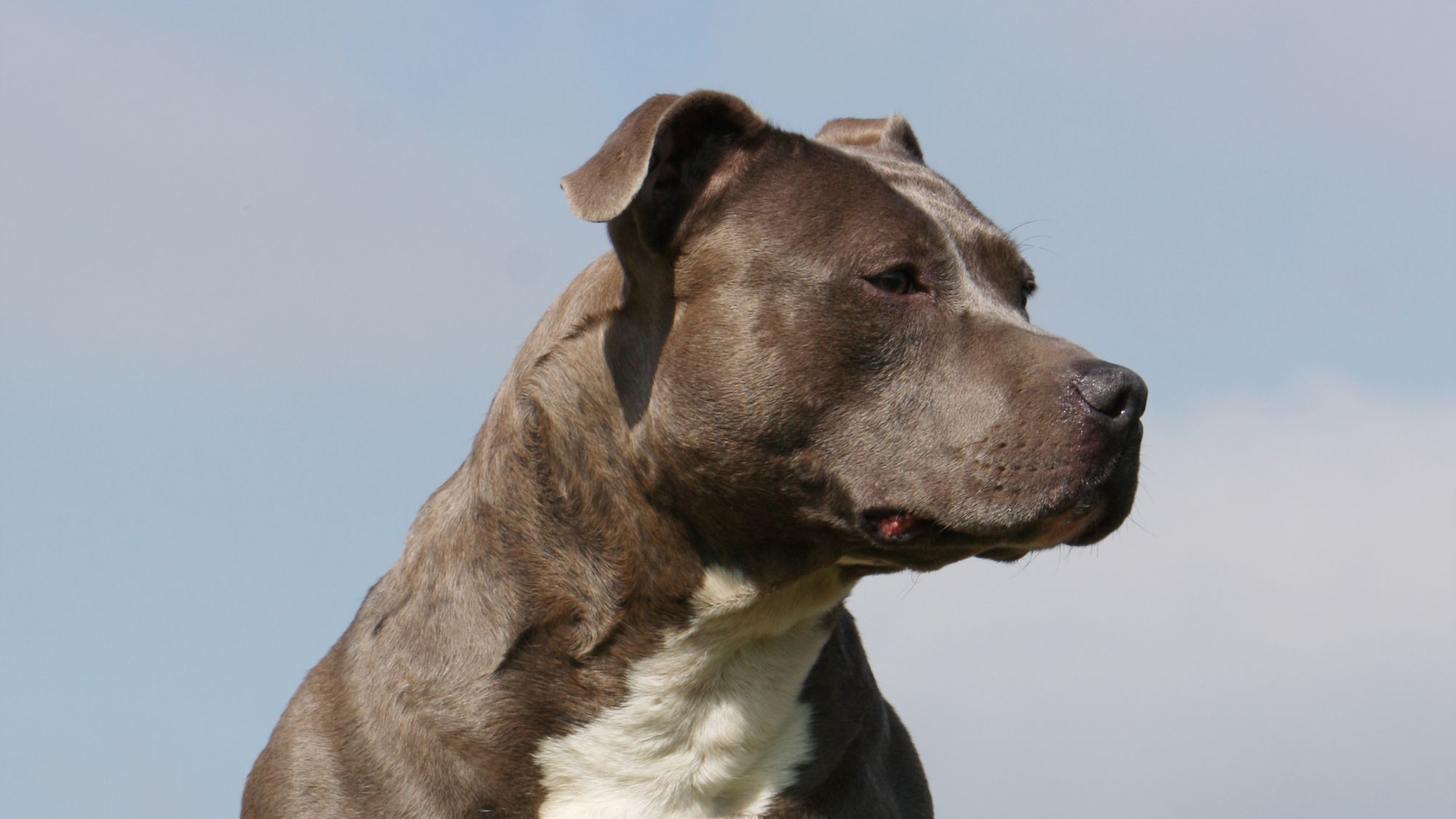
2/7
2 facts about American Staffordshire Terrier
1. We can be heroes
Stubby was an American Staffordshire Terrier who earned the rank of sergeant. Yes, you read that correctly. This brave canine served in 17 battles during World War I, surviving two shrapnel hits, to become the most decorated dog of WWI. Sgt. Stubby is proof that anything is paws-ible.
2. A tight leash
The American Staffordshire Terrier is a people person but other canines? That’s a different story. They should always be kept on a leash as even the most well-trained American Staffordshire Terrier will go into protective mode when accosted. In certain parts of the country (or world) over-cautious types have deemed it necessary to put a muzzle on your American Staffordshire Terrier when out and about. Rules are rules.
History of the breed
The American Staffordshire Terrier has English ancestry that can be traced back to the Bulldog. Because their ancestors were bred to fight, people can still make the mistake of associating the American Staffordshire Terrier with their gladiator past.
The breed’s most recent ancestor, the Staffordshire Bull Terrier, was introduced to the States in the 1850s. By the start of the 20th century, the breed was officially recognised by the United Kennel Club (UKC) as American Pit Bull Terriers. In 1976, the AKC recognised the breed as the American Staffordshire Terrier as breeding had created a clear difference between the original Staffordshire Bull Terrier and its bigger American counterpart.
Today’s American Staffordshire Terrier is friendly and affectionate with people, obedient and responsive in regards to training, which makes them a lovable canine addition for active households who like to spend time outdoors.

4/7
From head to tail
Physical characteristics of American Staffordshire Terriers
1. الأذنان
آذان مرنة ولكن ليست ثقيلة تتدلى بجانب رأس الكلب
2. الشعر
شعر قصير وكثيف فوق طبقة سفلية مقاومة للماء
3. الفراء
فراء يتراوح بين الأسود إلى لون الشوكولاتة أو الأصفر، ومن الكريمي الفاتح إلى المحمر
4. الذيل
ذيل منتصب وهو بطبيعته طويل ونادرًا ما يتوقف عن الاهتزاز – والجسم كله يمكن يهتز في بعض الأحيان.
5. الساقان والعمود الفقري
متناسب بشكل جيد، مع توازن جيد بين طول الساق والعمود الفقري.
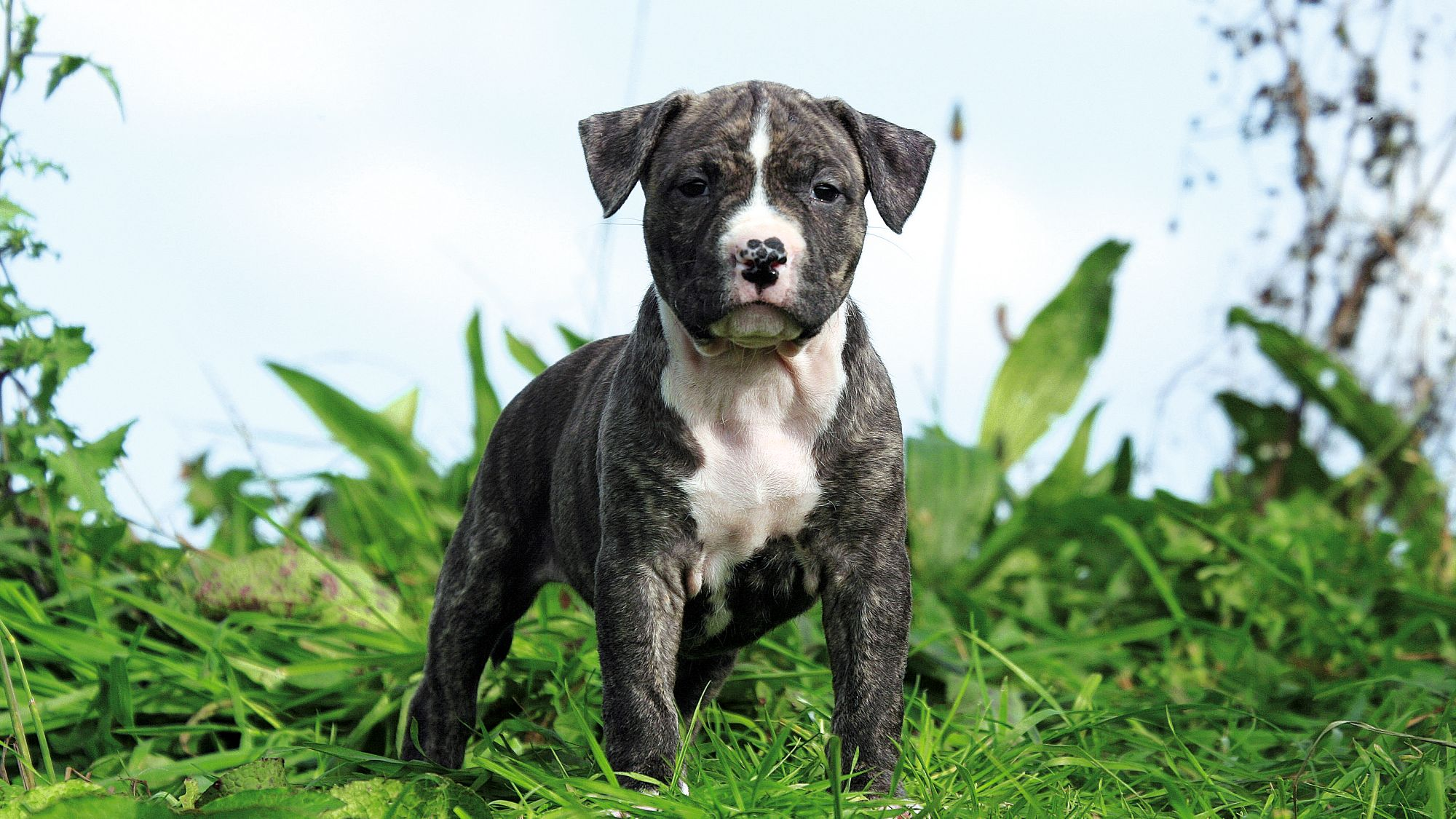
5/7
Things to look out for
From specific breed traits to a general health overview, here are some interesting facts about your American Staffordshire Terrier
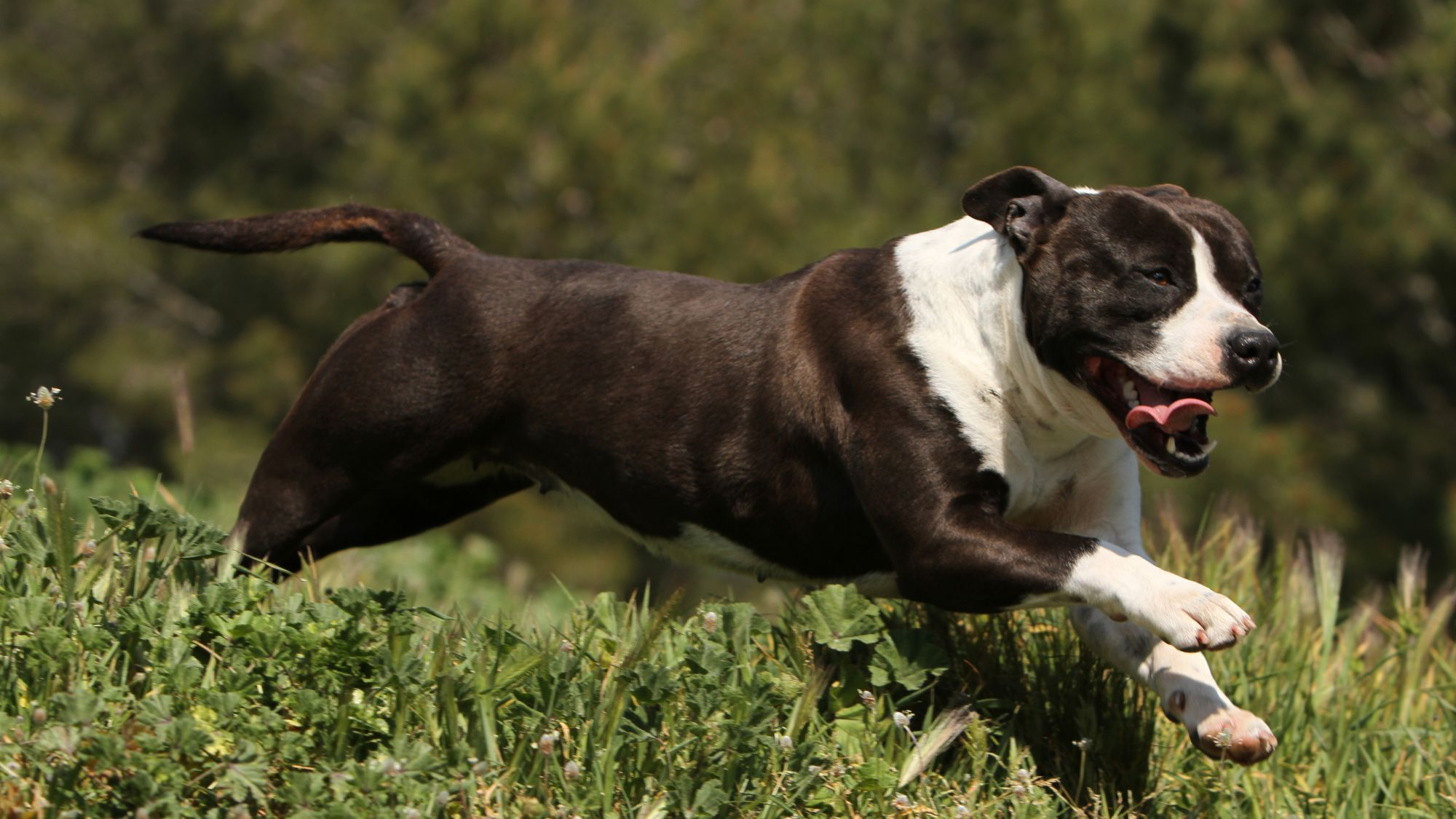
6/7
Caring for your American Staffordshire Terrier
Grooming, training and exercise tips
How to groom your American Staffordshire Terrier? With their short, stiff coat, one weekly brush with soft bristles will do the trick. Ideally, teeth should be brushed daily – if your American Staffordshire will let you – while ears should be inspected and nails clipped regularly. Early training is essential for the American Staffordshire Terrier. This breed is strong-willed but they are also quick learners so establish good habits and you will both reap the rewards. Plenty of chew toys around the house will help to keep them out of trouble. The American Staffordshire Terrier needs between 60-90 minutes of daily exercise. Likes include: Chasing balls, brief runs and long strolls—always on a leash. Dislikes: Cold weather due to their short coat. Keep them warm with the latest canine athleisure wear and keep it to short, sharp bursts.7/7
All about American Staffordshire Terriers
The American Staffordshire Terrier is an affectionate dog, capable of being very devoted to its owner. Once trained, you can even add “great with children” to their resumé, which makes the breed a welcome addition to a pet-free household. Teaching the American Staffordshire Terrier good social skills from when they are a puppy will result in an even-tempered companion who sticks to you like glue and never refuses an opportunity to cuddle.
The easy-going temperament of the American Staffordshire Terrier means that they don’t tend to bark much. There is one exception however: The American Staffordshire Terrier will bark if they are bored. Keep them occupied with exercise, throw them a chew toy, or take them with you to run errands, and the problem is easily resolved. Your neighbours will also be happy.
Read more on this topic


How to adopt a dog

Things to consider before getting a dog
Sources
1 - Veterinary Centers of America https://vcahospitals.com/
2 - Royal Canin Dog Encyclopaedia. Ed 2010 and 2020
3 - Banfield Pet Hospital https://www.banfield.com/
4 - Royal Canin BHN Product Book
5 - American Kennel Club https://www.akc.org/